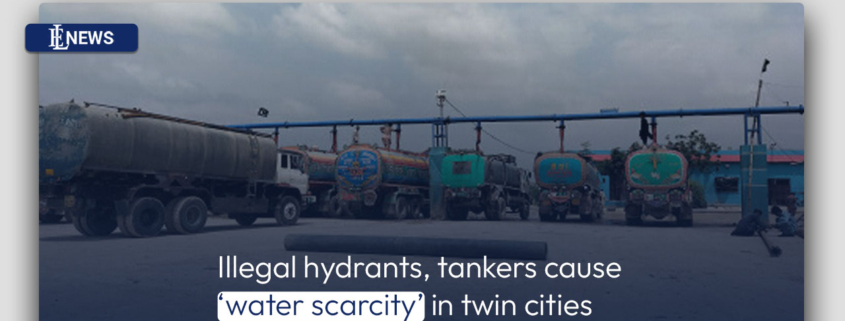Illegal hydrants, tankers cause ‘water scarcity’ in twin cities
ISLAMABAD: Commercial tube wells and illegal water hydrants are on the rise in Islamabad and Rawalpindi due to a lack of water, but local authorities have been unable to stop the growth of the private tanker mafia or the unchecked extraction of groundwater by commercial tube wells.
Read more with EL news: Government limits incentives for refinery modernization
The Capital Development Authority (CDA) and the Water and Sanitation Agency (Wasa) required to regularize the operation of hundreds of illicit hydrants and tankers that were being used in the twin cities.
A tanker costs between Rs2,200 and Rs2,500, and residents who experience a water shortage in their local communities are forced to rely on these tankers to meet their water demands. However, the CDA in Islamabad and Wasa in Rawalpindi are solely responsible for providing water to the population, and both organizations have fallen short of this obligation because of “their limited resources”. Wasa relies on the water it receives from Rawal Dam and its tube wells, while CDA currently relies on Simly Dam and its tube wells.
However, groundwater resources have almost completely dried up due to the hydrants’ quick ascent. “Our entire community has dried up because of unauthorized fire hydrants. Iftikhar Shah, a resident of Dhoke Syedan, said that it was wrong for someone to take the portion of water intended for the entire community and sell it. On the other hand, the owner of a hydrant claimed that since he was pumping water from his property, no one else had any right to complain.
Terms used formally private tanker services regrettable necessity brought on by limitations of capabilities
The CDA has cut out over 40 unauthorized water supply connections. “Over the past few months, unauthorized hookups have had a negative impact on Islamabad’s water supply. An official news release stated that the number of complaints was rising everyday and that numerous sections had substantially reduced water pressure.
A top official of the Islamabad District Administration told Dawn that hundreds of people would have no alternative way to obtain water for daily use if the administration did take action against illegal hydrants. “The government must provide water to the people, and if I stop private tanker services, there will be chaos,” he continued. Any action taken against the current services, according to him, would lead to a number of issues until the CDA undertook a survey and identified sites for private water tube wells.
The Rawalpindi district administration established a committee to gather information about unlawful hydrants and to guarantee the provision of clean water to citizens at an affordable price in response to a high court judgement given last year.
The committee, however, has not been informed. According to a senior district administration official, the district administration has uncovered more than 89 unlawful fire hydrants in the district after conducting a review of those under its administrative jurisdiction.
Wasa concluded its assessment of the area and discovered 59 unlawful water hydrations in the city areas, which it would regularize, according to Wasa spokesman Umer Farooq. He claimed that a committee was established by the district administration to set the prices for water tanker fees. Through these hydrants, the official claimed, the organization will guarantee the inhabitants’ access to clean, of high quality drinking water.
Development of Mushrooms in Tubewells
Meanwhile, residents in the expansive residential neighborhood of Khanna East along the Motorway have complained that the water table has been severely depleted by the mushrooming of private tube wells intended for commercial use.
They claimed that the fast expansion of deep boreholes (tube wells) in the area was left unchecked by the CDA and the ICT administration. They cited the recent emergence of numerous deep boreholes, some of which reached depths of 600–700 feet, which dried up the majority of residential boreholes in the region.
The Service Road now has about ten tube wells, according to the locals. They noted that a borehole had previously reached a depth of 300 to 400 feet, but when the water table significantly dropped, it has now dwindled to 600 to 700 feet.
A homeowner named Chaudhry Arif informed Dawn that the CDA and the ICT had abdicated their duty to curb the escalating number of deep boreholes along the Service Road. He claimed that in order to sell water, people have recently begun to erect tube wells in vacant areas along the streets.
Mr. Arif claimed that despite their attempts to contact the appropriate parties, the residents of his block had no luck.
Another local, Allah Ditta, claimed that after receiving payment, the appropriate officials released the proprietors of these tube wells from responsibility. He brought up how the area’s assistant commissioner had recently halted tube well activities due to objections from the public, only to have the activity pick back up a few days later.
The locals said that the government should outlaw the practice and punish those who operate tube wells without a no-objection certificate severely. They feared that if the practice was not stopped, underground water might completely dry up.
Sardar Khan Zimri, the director of CDA Sanitation, told Dawn that the ICT or the local government should handle such problems in Islamabad’s rural districts since the civic authority wasn’t responsible for them. However, he claimed that prohibiting private tube wells required the government to provide inhabitants with water, which was impractical.
The activities of these tube wells were occasionally halted due to public concerns, according to Mr. Zeeshan, the assistant commissioner in Khanna, but the owners were able to have the orders reversed through the courts. He declared that any tube well used for commercial purposes in a neighborhood will be shut.



